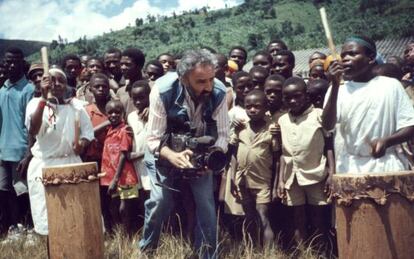Jesús Mata, 64, witness to history
The TV cameraman risked his life to give viewers a better sense of world events

When he passed away at the age of 64 on Friday, Jesús Mata left an empty space in the hearts of friends, family and colleagues that will never be filled again. But he also left us a fabulous memory of several decades' worth of our lives - convulsed, often dramatic decades that encompassed parts of two centuries that others will be able to evoke with greater precision thanks to Mata's work.
I spent many hours sitting side by side with Mata, enduring difficult circumstances - the darkness, the gunshots echoing in the distance - that help you get to know a person deep down and appreciate their human values, beyond their professional capacity. I will never know what I found most admirable in him: his artistic sensitivity and journalistic flair, or his serene demeanor in the face of adversity.
Mata, born in Madrid in 1948, had a great eye for capturing the best shots using the most expressive combinations of light and shadows, and the most revealing frame. It was as though he were able to get to the bottom of the story without taking anything away from its visual impact. He was an exceptional cameraman, and every reporter of the era wanted him as a traveling companion to cover the riskiest stories. As a camera expert, the quality of his work was assured and as a colleague on tough assignments, he inspired confidence in others. At crucial moments he spoke little, proof that he thought a lot, because everything he said was as accurate as it was opportune.
Jesús Mata was part of a unique generation of television cameramen who worked for state broadcaster Televisión Española and were trained in-house by veterans of the movie industry.
Every reporter of the era wanted him as their traveling companion
Just like his colleagues Evaristo Canete, José Luis Márquez, José Manuel Reverte, José Manuel Maellas, Laureano González and others, he risked his own life on multiple occasions so as to give viewers a better sense of what was happening on any given continent, whether it was a war, famine or earthquake.
Mata's legacy will only be fully appreciated when future generations use his expressive images to understand events that will by then be part of the history curriculum in schools - from the independence of Equatorial Guinea, the last Spanish colony to obtain sovereignty, in 1968, to 9/11 in New York and the genocide in Rwanda. It is all captured for eternity by the unerring eye of Jesús Mata.
Tu suscripción se está usando en otro dispositivo
¿Quieres añadir otro usuario a tu suscripción?
Si continúas leyendo en este dispositivo, no se podrá leer en el otro.
FlechaTu suscripción se está usando en otro dispositivo y solo puedes acceder a EL PAÍS desde un dispositivo a la vez.
Si quieres compartir tu cuenta, cambia tu suscripción a la modalidad Premium, así podrás añadir otro usuario. Cada uno accederá con su propia cuenta de email, lo que os permitirá personalizar vuestra experiencia en EL PAÍS.
¿Tienes una suscripción de empresa? Accede aquí para contratar más cuentas.
En el caso de no saber quién está usando tu cuenta, te recomendamos cambiar tu contraseña aquí.
Si decides continuar compartiendo tu cuenta, este mensaje se mostrará en tu dispositivo y en el de la otra persona que está usando tu cuenta de forma indefinida, afectando a tu experiencia de lectura. Puedes consultar aquí los términos y condiciones de la suscripción digital.








































